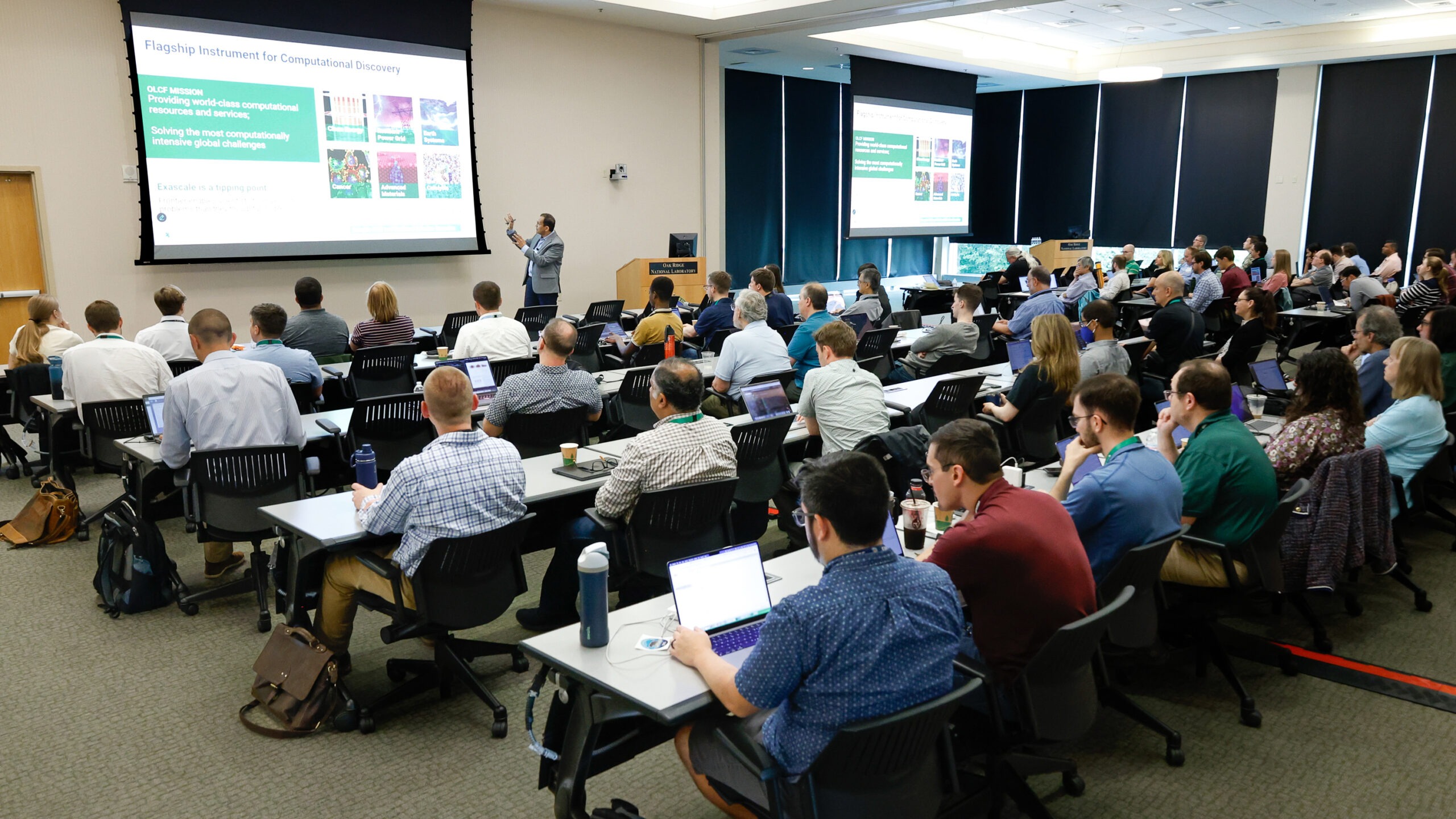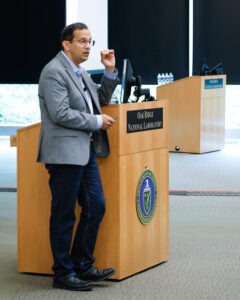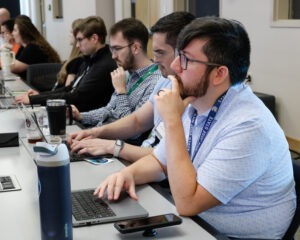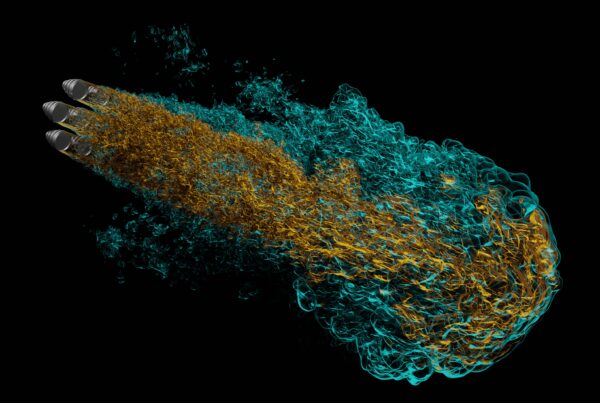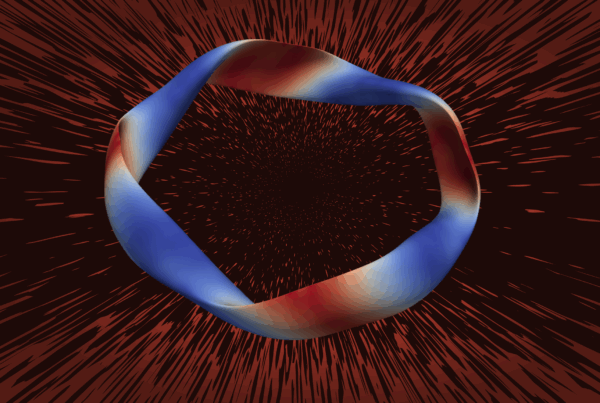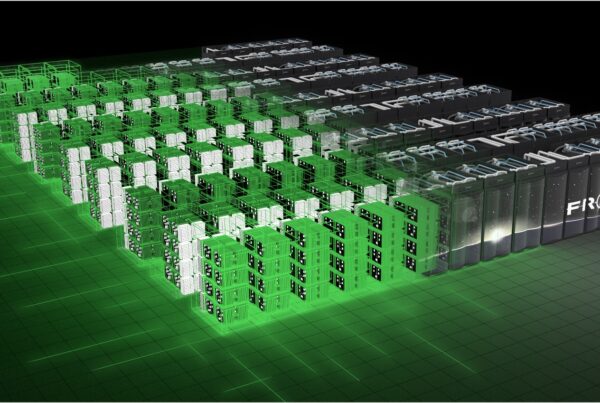The Oak Ridge Leadership Computing Facility (OLCF) welcomed computational scientists from around the world to its 2025 OLCF User Meeting at the Department of Energy’s Oak Ridge National Laboratory from Aug. 5 – 6. The event offered attendees an opportunity to share accomplishments, discuss challenges, and explore the road ahead for high-performance computing (HPC) and quantum computing research.
The 21st annual event attracted significant participation with approximately 150 attendees. Roughly half the participants attended in person in ORNL’s conference center while the rest participated virtually.
Advancing HPC, AI and quantum computing at ORNL
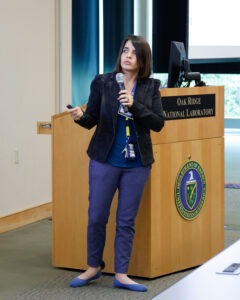
The 2025 OLCF User Meeting was chaired by ORNL’s Verónica Melesse Vergara. Credit: Kurt Weiss/ORNL, U.S. Dept. of Energy
This year’s meeting was chaired by Verónica Melesse Vergara, head of the HPC Operations Section for the National Center for Computational Sciences, (NCCS), with coordination from MacKenzie Boyd, OLCF project specialist, and Josh Cunningham, IT project manager. They worked alongside 19 other NCCS staff as part of the OLCF User Meeting Planning Committee. Attendees spent two days learning about updates to OLCF’s user programs and engaging with other users, OLCF personnel, and vendors through in-person and virtual interactions.
“Through meaningful interactions with the staff, systems engineers, and everyone that brings OLCF to life, we provide a venue for networking and collaboration across a wide range of topics,” Melesse Vergara said. “Enabling science goes far beyond simply providing a large-scale machine — it’s about providing a whole user support ecosystem that nurtures discovery and innovation.”
Advancing HPC capabilities and moving toward the convergence of quantum and classical computing to enable next-generation research was a strong theme this year. Discussions spanned topics from the evolution of HPC tools to the growth of AI and quantum computing in scientific research.
Discovery supercomputer marks the future of high-performance computing
NCCS Director Arjun Shankar provided attendees with a glimpse into the facility’s future, highlighting the steps toward quantum-high-performance computing convergence. Shankar shared an update on Discovery, the OLCF’s upcoming leadership computing system. Scheduled for launch in 2028, Discovery will represent a critical step toward creating a “smart exascale ecosystem” that incorporates advanced AI connectivity, integrates scientific workflows, and connects with quantum technologies.
“The OLCF is committed to driving innovation in computational science to meet the world’s most complex scientific challenges,” Shankar said. “Discovery will pave the way for deeper integration of HPC, AI, and quantum technologies in solving these challenges, enabling groundbreaking discoveries across all disciplines.”
Users received facility updates on MyOLCF, the self-service portal for facility users, and an update on ORNL’s AI initiative from Prasanna Balakaprash, ORNL’s director of AI programs. This year’s meeting also featured a variety of contributed user talks where attendees had the opportunity to hear about achievements by users from a variety of backgrounds, including industry users from Boeing and General Atomics.
Attendees learned about topics including containers and updates to the Frontier programming environment. OLCF office hours were available at this year’s meeting, providing users an opportunity to ask questions and share challenges. Additionally, the meeting featured a session on INCITE proposal submissions, offering guidance and tips for crafting proposals for DOE’s INCITE program.
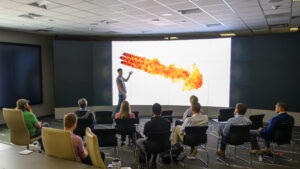
Spencer Bryngelson from Georgia Tech explains his research during a data visualization showcase during the 2025 OLCF User Meeting. Credit: Kurt Weiss/ORNL, U.S. Dept. of Energy
During the second day, attendees learned about the Quantum Computing User Program, which awards time on privately owned quantum devices around the country to support research projects. For the first time at a user meeting, attendees had the opportunity to participate in a hands-on quantum computing training using allotted time on machines from IonQ and IQM. The session provided an engaging introductory overview of quantum computing, designed specifically for beginners eager to gain hands-on experience with running problems on real quantum hardware.
For the second year in a row, the OLCF hosted a scientific data visualization showcase during the yearly meeting, giving users a chance to display their research on the large immersive display walls at ORNL’s EVEREST facility. Nine users presented their visualizations and shared a brief overview of their work before opening the floor for questions and discussion.
The poster session this year coincided with the visualization showcase and generated substantial interest, with 24 posters presented. Both the poster session and the data visualization showcase were highly interactive, sparking discussions and drawing active participation from attendees about what tools they used and how they successfully applied them to solve complex problems.
The OLCF User Meeting benefits from the support of the OLCF User Group (OUG), which provides advice and feedback on the facility’s operations and services. The OUG is represented by a 10-member Executive Board, which acts as an advocate for the OLCF user community.
For participants like Emily Belli, a General Atomics physicist and outgoing chair of the OUG Executive Board, the meeting provided a key venue to discover new tools and strategies that could directly impact their research.
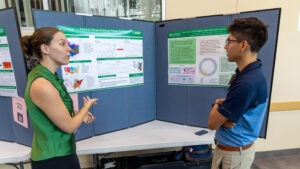
Attendees gather for a poster session during the OLCF User Meeting on Aug. 5, 2025.
Credit: Kurt Weiss/ORNL, U.S. Dept. of Energy
“The range of topics covered here is amazing,” Belli said. “Being part of an engaged user community allows us to exchange approaches and learn about resources that we might not have encountered otherwise.”
The OLCF is a DOE Office of Science user facility located at ORNL.
UT-Battelle manages ORNL for DOE’s Office of Science, the single largest supporter of basic research in the physical sciences in the United States. DOE’s Office of Science is working to address some of the most pressing challenges of our time. For more information, visit energy.gov/science.


